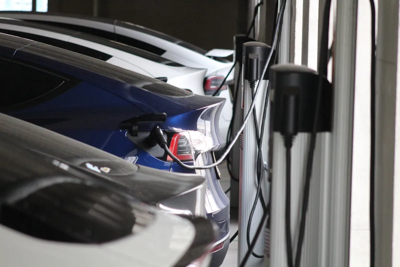(Spotlight Delaware is a community-powered, collaborative, nonprofit newsroom covering the First State. Learn more at spotlightdelaware.org).
Postcards informing residents of new fees coming to owners of electric vehicles have raised questions from the public.
The fees are part of a push to prepare Delaware’s roads and bridges for a future with more EVs driving on them – something that may be good for the environment, but bad for the way that the state has long funded transportation needs.
It coincides with a statewide increase in tolls that were enacted last month.
Here we break down what the new fees are, how to comply and why the state says it needs them.
Whom does the new fee apply to?
Owners of hybrid, plug-in or fully electric vehicles will be assessed an alternative fuel vehicles (AFV) registration fee, regardless of whether it is newly purchased or a vehicle that you already own.
How much is the fee?
The fee structure differs depending on the vehicle type and its weight.
Fully electric vehicles are the rechargeable EVs like Tesla that we come to think about today, while plug-in hybrid have both a gas-powered engine and small rechargeable battery.
Non-plug-in hybrids have a small battery that is typically charged through what’s known as “regenerative braking,” or the capturing of kinetic energy released when a vehicle decelerates.
Fully Electric Vehicles
- $110 a year if it weighs less than 6,000 pounds, e.g. Tesla Model S, Y or 3 sedans or a Chevrolet Equinox EV
- $150 a year if it weighs between 6,000 and 10,000 pounds, e.g. a Tesla Cybertruck or Ford F-150 Lightning
- $260 a year if it weighs between 10,000 and 26,000 pounds
- $900 a year if it weighs more than 26,000 pounds
Plug-In Hybrid Vehicle
- $85 a year if it weighs less than 6,000 pounds, e.g. Volvo XC60 Hybrid
- $115 a year if it weighs between 6,000 and 10,000 pounds, e.g. Porsche Cayenne E-Hybrid or Jeep Grand Cherokee 4xe
- $200 a year if it weighs between 10,000 and 26,000 pounds
- $600 a year if it weighs more than 26,000 pounds
Non-Plug-In Hybrid Vehicle
- $60 a year if it weighs less than 6,000 pounds, e.g. Hyundai Santa Fe Hybrid or Honda Civic Hybrid
- $80 a year if it weighs between 6,000 and 10,000 pounds
- $140 a year if it weighs between 10,000 and 26,000 pounds
- $480 a year if it weighs more than 26,000 pounds
Other Alternative Fuels (Hydrogen/Ethanol/Etc.)
- $110 a year if it weighs less than 6,000 pounds
- $150 a year if it weighs between 6,000 and 10,000 pounds
- $260 a year if it weighs between 10,000 and 26,000 pounds
- $900 a year if it weighs more than 26,000 pounds
Any Electric Motorcycle
- $15 a year
Any Electric Moped
- No fee
When is the due date for the new fee?
The new fee is scheduled to be implemented on Oct. 1, but its enforcement won’t begin on an existing owner until their registration is up for renewal.
Wasn’t there a November deadline to pay?
Yes, but not anymore.
The DMV originally set a Nov. 1, 2025, deadline to pay the new AFV fee, but House Speaker Melissa Minor-Brown said she found it “unacceptable” to charge such fees to properly registered existing vehicles and sought a revision.
As a result, the Delaware Department of Transportation revised its plan. The fee will now only apply when the hybrid or electric vehicle comes up for registration renewal so that drivers don’t have retroactive charges.
What happens if I don’t pay the fee?
Failure to pay the fee by the Nov. 1 deadline will lead to a denial of services by the Division of Motor Vehicles, meaning you wouldn’t be able to renew your vehicle or license registration, potentially putting yourself at risk of traffic fines or points on your driving record should you be pulled over for an expired license or registration.
Why is a new fee being applied?
With more fuel-efficient vehicles hitting the market, Delaware’s gas tax revenue, which makes up about 20% of the state’s transportation funding, is expected to flatten. Delaware is registering about 1,000 new alternative fuel vehicles every month, including electric cars that burn no fuel and therefore pay no fuel tax.
A study of the impact of fuel-efficient and electric vehicles on the state budget published last year by the University of Delaware found that, if current adoption rates continued, the state could lose an estimated $1 billion in revenue from the motor fuel tax between 2030 and 2050.
Do other states have this fee?
Yes. Delaware was one of only 11 states to not have instituted a special registration fee on electric vehicles meant to offset the loss of motor fuel taxes. It was the only state in the mid-Atlantic to not have one.
Maryland charges the lowest at $125 annually while New Jersey charges the highest rate in the nation at $260. While Pennsylvania has a $200 annual fee, it has planned numerous increases in coming years.
Delaware was joined by three other states this year to enact AFVs, which dropped the number of states without such a fee to just seven.
Do I still have to pay the normal registration fee?
Yes. The new alternative fuel vehicles (AFV) registration fee is on top of Delaware’s standard $40 a year vehicle registration fee.
I have more questions, whom would I contact?
For questions or for further assistance, customers can email DMVCustomerService@delaware.gov or call 302-744-2500.
To receive future DMV AFV registration fee information and invoices delivered securely via email, customers can register for eNotifications at Vehicle Registration eNotification Sign Up – Division of Motor Vehicles
Editor’s Note: This story has been updated to reflect the revision recently approved by the DMV on the timing of AFV payments.











(0) comments
Welcome to the discussion.
Log In
Keep it Clean. Please avoid obscene, vulgar, lewd, racist or sexually-oriented language.
PLEASE TURN OFF YOUR CAPS LOCK.
Don't Threaten. Threats of harming another person will not be tolerated.
Be Truthful. Don't knowingly lie about anyone or anything.
Be Nice. No racism, sexism or any sort of -ism that is degrading to another person.
Be Proactive. Use the 'Report' link on each comment to let us know of abusive posts.
Share with Us. We'd love to hear eyewitness accounts, the history behind an article.